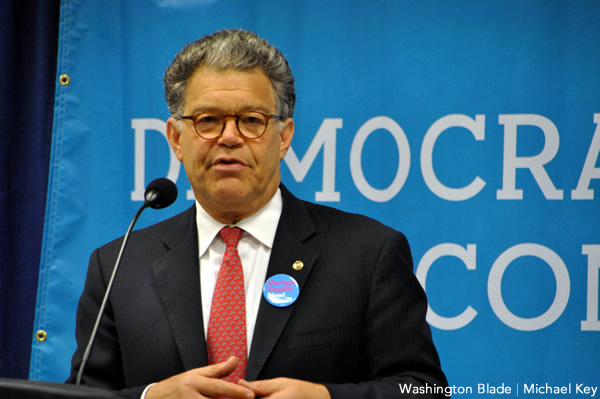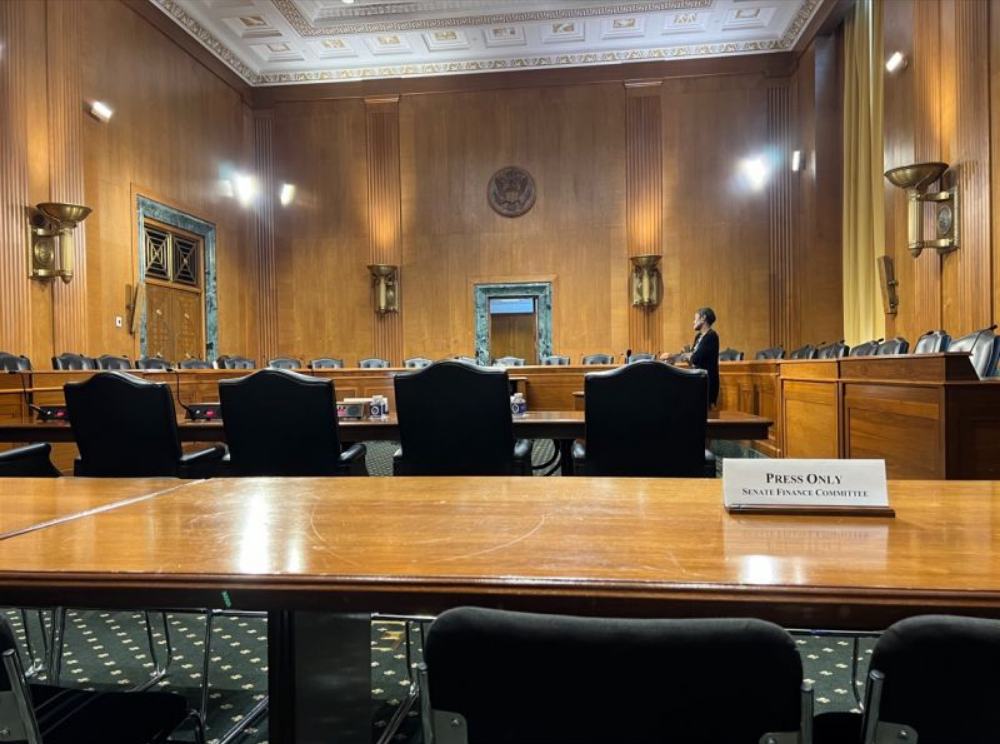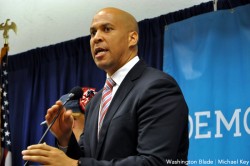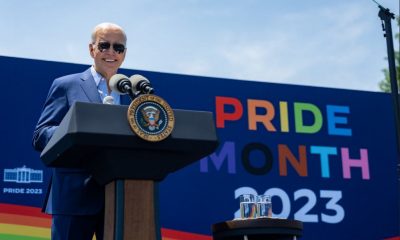National
DNC 2012: LGBT delegates greeted by Jill Biden, Rep. Frank
Second Caucus meeting focuses on ‘energizing base’


Minn. Sen. Al Franken addresses the LGBT delegates to the 2012 Democratic National Convention. (Washington Blade photo by Michael Key)
CHARLOTTE, N.C. – The Democratic National Convention’s LGBT Caucus was courted by high-level Obama administration officials, members of Congress, and Democratic Party luminaries on Thursday in its second of two meetings during the week of the convention.

DNC’s LGBT Caucus was courted by high-level Obama administration officials Thursday. (Washington Blade photo by Michael Key)
Jill Biden, wife of U.S. Vice President Joe Biden; Jim Messina, chair of the Obama re-election campaign; Hilda Solis, the U.S. Secretary of Labor; and Debbie Wasserman Schultz, chair of the Democratic Party, urged caucus members to help energize the Obama base — voters who support the president but who may need some prodding and reminders to turn out to the polls in November.
“I want you to know how much Joe and I and Barack and Michelle appreciate all that you are doing for this campaign all across this country,” Biden told the more than 500 LGBT delegates, alternate delegates and convention committee members who make up the LGBT Caucus.
“So much is at stake in this election. You know that, and especially for the LGBT community,” she said. “We’ve got to make sure we keep moving forward on gay rights so that we can continue the progress we’ve made.”
She added, “We have the first president and vice president in history to affirm support for gay marriage. Joe and Barack believe that no matter who you love everyone should have the same rights in this country.”
Messina, who served as White House Chief of Staff for Operations from 2009 to 2011 before heading the Obama re-election campaign, noted that he and gay White House aide Brian Bond worked closely together to push for passage of a federal hate crime law that includes gays and transgender people and for the repeal of “Don’t Ask, Don’t Tell,” the law that prohibited gays from serving openly in the military.
“I’m so proud to be part of this effort,” he said. “You have a president who stands for justice, fairness and equality.”
In a gesture that drew laughter and applause, Messina told LGBT Caucus members, “I just need two things from you in the next 61 days — all your time and all your money.”
Solis disputed claims by Republican presidential nominee Mitt Romney that the U.S. economy remains stalled, saying large numbers of private sector jobs have been created during the president’s tenure in office.
Similar to Kathleen Sebelius, the U.S. Secretary of Health and Human Services who spoke to the LGBT Caucus on Tuesday, Solis listed what she called the Obama administration’s unprecedented number of executive branch initiatives on LGBT rights, including a ban on employment discrimination against transgender people in the federal workforce.
Like Sebelius, she said a Romney presidency would likely roll back most if not all of those advances.
Gay U.S. Rep. Barney Frank (D-Mass.), who spoke before the full convention later in the day on Thursday, created a stir among leaders of the gay GOP group Log Cabin Republicans when he repeated to LGBT Caucus members a remark he made about Log Cabin in a radio interview earlier in the day with gay talk show host Michelangelo Signorile.
In the interview, Frank criticized Log Cabin for continuing to support Republican members of Congress who oppose LGBT rights legislation.
“For 20 years now I’ve heard Log Cabins say they were going to make Republicans better, but they’ve only gotten worse. I now realize why they call themselves Log Cabin: Their role model is Uncle Tom.”
Log Cabin President R. Clarke Cooper issued a statement denouncing Frank for hurling “bile” at gay Republicans in an effort to “demonize them.” Cooper noted that Log Cabin filed a lawsuit seeking to have “Don’t Ask, Don’t Tell” overturned by a court on constitutional grounds. He said the group worked with Republican members of Congress to line up Republican votes that made it possible to repeal “Don’t Ask, Don’t Tell.”
“As far as Log Cabin Republicans are concerned, it’s a badge of honor to be attacked by a partisan hack like Barney Frank,” Cooper said.
Frank couldn’t immediately be reached for comment on Cooper’s statement.
During his remarks before the LGBT Caucus, Frank said he understood and respected Log Cabin members who say they support the Republican Party and many of its leaders because they agree with them on non-LGBT issues like national defense and economic policy.
But Frank said the Republican Party’s overall positions on LGBT issues have gotten worse over recent years and he was troubled that Log Cabin members appear to be rationalizing assertions that the party’s stance on LGBT issues is improving.
Other speakers at the Thursday’s LGBT Caucus meeting included Newark, N.J., Mayor Cory Booker; Delaware Gov. Jack Markell; U.S. Sens. Al Franken and Amy Klobuchar, both Democrats from Minnesota; and former U.S. Deputy Secretary of Defense Doug Wilson.
Wilson, who is gay, invited LGBT caucus members who are veterans or members of the military to join him on the stage where he spoke. More than 30 caucus members walked on stage, drawing a loud, prolonged applause from the audience.
He then told of his experience meeting U.S. troops at Fort Hood, an Army base, in an effort to determine how active duty military members would react if “Don’t Ask, Don’t Tell” were repealed.
According to Wilson, the head of the base arranged for him to meet and speak with five solders assigned to an Army tank, where some military officials believed it would be difficult for an out gay soldier to work “in close quarters” with straight soldiers.
Wilson said he asked the four men assigned to the tank how they would react if “Don’t Ask, Don’t Tell” is repealed and they find out one of their compatriots assigned to the tank is gay.
“The first one said my brother is gay. And the second one said my cousin is gay,” Wilson told the caucus meeting. “The third one said I have all kinds of gay friends from high school and it doesn’t matter to me. And the fifth one said if this tank is burning I want someone to pull me out of there and I don’t care if they’re gay or straight.”
Wilson said stories like that were what convinced most U.S. military leaders and a majority of members of Congress to pass legislation repealing “Don’t Ask, Don’t Tell.” He credited President Obama with setting in motion the chain of events that eventually led to the repeal.
Indiana
Drag queen announces run for mayor of Ind. city
Branden Blaettne seeking Fort Wayne’s top office

In a Facebook post Tuesday, a local drag personality announced he was running for the office of mayor once held by the late Fort Wayne Mayor Tom Henry, who died last month just a few months into his fifth term.
Henry was recently diagnosed with late-stage stomach cancer and experienced an emergency that landed him in hospice care. He died shortly after.
WPTA, a local television station, reported that Fort Wayne resident Branden Blaettne, whose drag name is Della Licious, confirmed he filed paperwork to be one of the candidates seeking to finish out the fifth term of the late mayor.
Blaettner, who is a community organizer, told WPTA he doesn’t want to “get Fort Wayne back on track,” but rather keep the momentum started by Henry going while giving a platform to the disenfranchised groups in the community. Blaettner said he doesn’t think his local fame as a drag queen will hold him back.
“It’s easy to have a platform when you wear platform heels,” Blaettner told WPTA. “The status quo has left a lot of people out in the cold — both figuratively and literally,” Blaettner added.

The Indiana Capital Chronicle reported that state Rep. Phil GiaQuinta, who has led the Indiana House Democratic caucus since 2018, has added his name to a growing list of Fort Wayne politicos who want to be the city’s next mayor. A caucus of precinct committee persons will choose the new mayor.
According to the Fort Wayne Journal Gazette, the deadline for residents to file candidacy was 10:30 a.m. on Wednesday. A town hall with the candidates is scheduled for 6 p.m. on Thursday at Franklin School Park. The caucus is set for 10:30 a.m. on April 20 at the Lincoln Financial Event Center at Parkview Field.
At least six candidates so far have announced they will run in the caucus. They include Branden Blaettne, GiaQuinta, City Councilwoman Michelle Chambers, City Councilwoman Sharon Tucker, former city- and county-council candidate Palermo Galindo, and 2023 Democratic primary mayoral candidate Jorge Fernandez.
Arizona
Ariz. governor vetoes anti-transgender, Ten Commandments bill
Katie Hobbs has pledged to reject anti-LGBTQ bills that reach her desk

BY CAITLIN SIEVERS | A slew of Republican bills, including those that would have allowed discrimination against transgender people and would have given public school teachers a green light to post the Ten Commandments in their classrooms, were vetoed by Gov. Katie Hobbs on Tuesday.
Hobbs, who has made it clear that she’ll use her veto power on any bills that don’t have bipartisan support — and especially ones that discriminate against the LGBTQ community — vetoed 13 bills, bringing her count for this year to 42.
Republicans responded with obvious outrage to Hobbs’s veto of their “Arizona Women’s Bill of Rights,” which would have eliminated any mention of gender in state law, replacing it with a strict and inflexible definition of biological sex. The bill would have called for the separation of sports teams, locker rooms, bathrooms, and even domestic violence shelters and sexual assault crisis centers by biological sex, not gender identity, green-lighting discrimination against trans Arizonans.
“As I have said time and again, I will not sign legislation that attacks Arizonans,” Hobbs wrote in a brief letter explaining why she vetoed Senate Bill 1628.
The Arizona Senate Republicans’ response to the veto was filled with discriminatory language about trans people and accused them of merely pretending to be a gender different than they were assigned at birth.
“With the radical Left attempting to force upon society the notion that science doesn’t matter, and biological males can be considered females if they ‘feel’ like they are, Katie Hobbs and Democrats at the Arizona State Legislature are showing their irresponsible disregard for the safety and well-being of women and girls in our state by killing the Arizona Women’s Bill of Rights,” Senate Republicans wrote in a statement.
The Senate Republicans went on to accuse the Democrats who voted against the bill of endangering women.
“Instead of helping these confused boys and men, Democrats are only fueling the dysfunction by pretending biological sex doesn’t matter,” Senate President Warren Petersen said in the statement. “Our daughters, granddaughters, nieces, and neighbors are growing up in a dangerous time where they are living with an increased risk of being victimized in public bathrooms, showers, and locker rooms because Democrats are now welcoming biological males into what used to be traditionally safe, single-sex spaces.”
But trans advocates say, and at least one study has found, that there’s no evidence allowing trans people to use the bathroom that aligns with their identity makes those spaces less safe for everyone else who uses them.
In the statement, the bill’s sponsor, Sen. Sine Kerr (R-Buckeye), claimed that the bill would have stopped trans girls from competing in girls sports, something she said gives them an unfair advantage. But Republicans already passed a law to do just that in 2022, when Republican Gov. Doug Ducey was still in office, though that law is not currently being enforced amidst a court challenge filed by two trans athletes.
Republicans also clapped back at Hobbs’ veto of Senate Bill 1151, which would have allowed teachers or administrators to teach or post the Ten Commandments in public school classrooms, a measure that some Republicans even questioned as possibly unconstitutional.
In a statement, the bill’s sponsor, Sen. Anthony Kern (R-Glendale), accused Hobbs of “abandoning God” with her veto.
“As society increasingly strays away from God and the moral principles our nation was founded upon, Katie Hobbs is contributing to the cultural degradation within Arizona by vetoing legislation today that would have allowed public schools to include the Ten Commandments in classrooms,” Kern said in the statement.
In her veto letter, Hobbs said she questioned the constitutionality of the bill, and also called it unnecessary. During discussion of the bill in March, several critics pointed out that posting the Ten Commandments in public school classrooms, tenets of Judeo-Christian religions, might make children whose families practice other religions feel uncomfortable.
“Sadly, Katie Hobbs’ veto is a prime example of Democrats’ efforts to push state-sponsored atheism while robbing Arizona’s children of the opportunity to flourish with a healthy moral compass,” Kern said.
Another Republican proposal on Hobbs’s veto list was Senate Bill 1097, which would have made school board candidates declare a party affiliation. School board races in Arizona are currently nonpartisan.
“This bill will further the politicization and polarization of Arizona’s school district governing boards whose focus should remain on making the best decisions for students,” Hobbs wrote in her veto letter. “Partisan politics do not belong in Arizona’s schools.”
******************************************************************************************

Caitlin joined the Arizona Mirror in 2022 with almost 10 years of experience as a reporter and editor, holding local government leaders accountable from newsrooms across the West and Midwest. She’s won statewide awards in Nebraska, Indiana and Wisconsin for reporting, photography and commentary.
******************************************************************************************
The preceding piece was previously published by the Arizona Mirror and is republished with permission.
Amplifying the voices of Arizonans whose stories are unheard; shining a light on the relationships between people, power and policy; and holding public officials to account.
Arizona Mirror is part of States Newsroom, the nation’s largest state-focused nonprofit news organization.
National
Senate committee: Republican attorneys general abused power demanding trans medical records
AGs used ‘abusive legal demands’

In a 10-page report released on Tuesday by staff for the Democratic majority of the U.S. Senate Finance Committee, the Republican attorneys general of Tennessee, Missouri, Indiana, and Texas are accused of using “abusive legal demands” to collect the medical records of transgender patients in furtherance of the attorneys general’ “ideological and political goals.”
According to the document, which is titled “How State Attorneys General Target
Transgender Youth and Adults by Weaponizing the Medicaid Program and their Health Oversight Authority,” the attorneys general used specious or misleading legal pretexts to justify their issuance of civil investigative demands to healthcare providers.
For example, the office of Tennessee Attorney General Jonathan Skrmetti framed the request as part of a probe into the potential misuse of Medicaid funds, while the offices of Indiana Attorney General Todd Rokita and Missouri Attorney General Andrew Bailey cited suspected violations of consumer protection laws. The office of Texas Attorney General Ken Paxton, which demanded records from “at least two hospitals located in Texas as well as at least two medical providers” in Washington and Georgia, did not disclose why the requests were issued.
The report found that information requested by the attorneys general’s offices included “invasive items such as unredacted physical and mental health records, photographs of children’s bodies, correspondence to hospitals’ general email addresses for LGBTQIA+ patients, and lists of people referred for transgender health care.”
In response, and in what the committee called “a grave violation of patient privacy and trust,” some providers turned over “near-complete, patient-identifiable” information while others used legal processes available to them such as privacy protections in the Health Insurance Portability and Accountability Act to share fewer details with the attorneys general’s offices.
The report noted that Vanderbilt University Medical Center in Nashville had “failed to object in any material manner to the Tennessee attorney general’s sweeping request and then caused undue terror to young patients and their families by supplying the Tennessee attorney general with some of the records requested and then, again, by erroneously notifying some patients of medical record disclosures that had not occurred.”
News concerning Vanderbilt’s receipt of and compliance with the demands from Skrmetti’s office was made public in June, sparking widespread concern and panic among many of the center’s trans patients and their families. Some, according to the report, experienced suicidal ideation and emotional distress including depression and anxiety.
A plaintiffs’ lawsuit was filed in July over VUMC’s failure to redact personally identifying information from the medical records. The following month, the center disclosed plans to comply with an investigation by the U.S. Department of Health and Human Services Office of Civil Rights.
In a statement to NBC News, Michael Regier, the medical center’s general counsel and secretary, said the hospital disputes the findings published in the committee’s report and had submitted “a detailed letter outlining our concerns about its proposed findings before it was released.”
“We made every effort to both protect our patients and follow the law,” Regier said, adding that “At no point did we violate privacy laws, and we strongly disagree with any suggestion that we did.”
However, the committee’s report notes that by contrast, providers in other states like the Washington University School of Medicine in St. Louis refused to turn over patient records, citing privacy concerns and HIPPA regulations. And after staff for U.S. Sen. Ron Wyden (D-Ore.), the committee chair, had requested and reviewed copies of correspondence between VUMC and the Tennessee attorney general’s office, they concluded that the documentation “sheds light, for the first time, on the full extent of VUMC’s acute and repeated failures to protect its patients.”
For example, the report explains that after Skrmetti’s office issued the initial request to VUMC, it followed up with two additional civil investigative demands for “confidential information across 18 categories without any bounds on the number of patients or people implicated” ranging from “employment contracts for physicians to volunteer agreements for the
VUMC Trans Buddy Program to communications to and from a general email address.”
In response, the hospital shared “65,000 pages of documents, including the medical records of 82 transgender patients.” The information that was provided pursuant to receipt of Skrmetti’s office’s third civil investigative demand is unknown.























